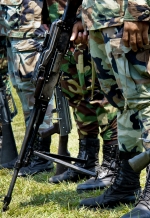Ilankai Tamil Sangam30th Year on the Web Association of Tamils of Sri Lanka in the USA |
||||||||||
 Home Home Archives Archives |
Colombia's Landmark Ruling Orders Reparations for Former Child Soldiersby International Center for Transitional Justice, New York, January 13, 2012
December 16, 2011 saw the world’s first ruling mandating reparations be paid for the unlawful recruitment of minors into armed forces. More than 300 former youth paramilitaries in Colombia will receive reparations including monetary compensation and medical and psychological care. One hundred and twenty young men and women who were demobilized from the Élmer Cárdenas paramilitary group attended reparations hearings in the lawsuit against the armed group’s former leader Fredy Rendón Herrera, alias “El Alemán,” to claim compensation for having been illegally recruited as minors. Today, six years after their demobilization, they are adults whose lives have been shattered by the effects of having belonged to the illegal armed group. “Communities reject them and discriminate against them,” said victims’ representative Elizabeth Díaz. “People are afraid of them, and they’re afraid too.” The Rendón trial established that 309 minors from municipalities including Riosucio, Unguía, Mutatá, and Dabeiba, were illegally recruited by the paramilitary group. “I joined at 16… life isn’t the same because society rejects you,” said one young man during the hearing. “I joined because they were going to give me a lot of money,” another stated. “When I went into the self-defense force my mom had to leave the village.” “I had an accident that left me with a wound in the head; I lost both eardrums,” were some of the testimonies heard. Evidence presented in the trial identified the recruitment of boys and girls by this group as a widespread and systematic practice. After being admitted to the armed group, minors were taken to various training schools and taught to use weapons and perform intelligence tasks.
Youth were also given intelligence work exposing them to the risk of being captured or killed. “When a minor enters an armed group, the first thing he or she loses is the right to an identity, a family to have ties to. His or her right to play-time, education, and social protection is violated,” anthropologist Rocío Rubio Serrano told the court. When asked about their expectations for reparation, several young people said that they would feel compensated by access to an education and job opportunities. They requested help to overcome social rejection, which prevents them from finding employment, as well as financial reparations and psychological support. “Reparations measures for these young people should acknowledge their status as victims, and clarify the context and nature of recruitment as a serious crime to be renounced,” said Carlos Lozano Acosta of ICTJ’s Colombia office. “At the same time, they should seek to remedy the loss of childhood and, to the extent they can, the opportunities lost with it. “Reparations should also take into account pre-existing mechanisms for child protection and the reintegration of former paramilitaries. Lastly, these measures must also consider the different effects of recruitment on girls, as well as on the victims’ communities.”
Additional compensation is to be paid to girls, “who were in a situation of potential assault or harassment from other combatants.” The ruling also demanded investigation into crimes of sexual violence and cruel and inhuman treatment, such as personal injury due to disproportionate physical effort and torture. To promote rehabilitation, the ruling contains provisions for medical and psychological treatment of trauma experienced by recruited youth. For the families, there is a group therapy program, “in order to understand and re-signify the boys’ and girls’ time in the illegal armed group and to counteract illegal ethics and socialization models.” The ruling lastly exhorts the government to prevent the recruitment of children as a way of ensuring non-recurrence. ICTJ recently released a report titled “Through a New Lens: A Child-Sensitive Approach to Transitional Justice,” focusing on the protection and promotion of the rights of youth in post-conflict and post-authoritarian transitions, and how to address the considerations and experiences of youth through transitional justice mechanisms. In a chapter dedicated to children and reparations, this report highlights Colombia as the only country with an administrative reparations program that identifies children as primary victims based on their illegal recruitment. “Through a New Lens” will be formally launched January 19, 2012 at the United Nations in New York. |
|||||||||
|
||||||||||
